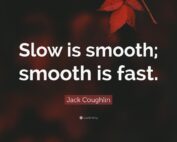
AC-032621-S2M4T1005-800
Intelligence aka intel is defined as information discretely collected and processed to provide guidance and direction in helping leadership make decisions. It can be applied to politics, the military, business and in your own personal life. You can develop intelligence on anyone or anything.
The need for intelligence has been around since the first caveman village attacked the second cave man village. You can find references to intelligence as far back as in the Old Testament (Numbers 13:1), and in the writings of famed military strategist Sun Tzu (550 BC), who was a strong advocate for intelligence because of its use in avoiding military casualties. From his highly revered treatise “The Art of War” Sun Tzu is credited with “Foreknowledge is what enables a wise king to rule well and a good general to achieve things far beyond ordinary men.”
Fast forward about two and a half millennia, and nothing much has changed with regards to intelligence. Political leaders still use it to determine foreign policy. Military intelligence remains a discipline that uses vetted information as part of operational planning. Corporate or industrial espionage is the practice of using both open and clandestine collection techniques for commercial or financial purposes.
Ranging from searching for the best price on a house or a car to keeping your family safe, intelligence can be applied to any decision-based objective requiring foreknowledge. Quality intelligence or “good intel” is developed by a three-part process referred to by the experts as collection, analysis and application.
COLLECTION
Intelligence must first be gathered. If you want to find out about something on the down-low, you can easily refer to a resource we have available to us today that was not available to either Moses or Sun Tzu and that is the omnipotent and omniscient internet.
Referred to as open source intelligence or OSINT (as it’s known to secret squirrels), this is usable information which is readily available and at your fingertips on any online device. Given time and determination, you can find a tremendous amount of usable information on the internet on just about any person, business, entity or topic you can imagine.
Another modality of data collection is referred to as human intelligence or HUMINT (as it’s known to secret squirrels). In this case you would send say your mother-in-law into your competitor’s business posing as a customer to find out how much a specialty item might cost or other info that may not be readily available via OSINT.
General rule of thumb when it comes to information collection, the higher the target information value, the more difficult it is to collect.
ANALYSIS
Now that you’ve collected a bunch of information, it must be organized in such a manner that it can be thoroughly reviewed and survive a stringent analysis process. The analysis process determines the likelihood of your information being applicable. In this phase of developing good intelligence, there are three tests by which your information must pass muster. These filters are listed in order of priority:
1.It must be current.
2. It must be relevant.
3. It must be useful.
You can have a thousand gigabytes of information on a particular person or topic, but if it’s somewhat dated, then it doesn’t pass the “is it current” sniff test. The older the information is, the less likelihood it is of still being accurate and it gets kicked out of the analysis process. Items such as date of birth or date of manufacture of course won’t change, but what status (go or no-go) or condition (excellent or poor), quality or quantity may readily change.
You can have the most up-to-date info available but if it is not relevant to what you intend to apply it, then it gets kicked out of the process. If you’re planning a vacation and researching the safety of a particular hotel abroad, and you discover that they announced a breakfast special ten minutes ago, yes, that is very current information but has no relevance to your primary objective.
If your info makes it this far through the analysis process, then the very last Scooby sniff test is usefulness. How useful is your information? If you are digging up details about someone who is dating your daughter (taking her out for ice cream) and you uncover the current and relevant information that their favorite ice cream is strawberry shortcake—as opposed the fact that they may be a registered sex offender—accurate ice cream flavor turns out to be not as useful a piece of information.
APPLICATION
Lastly, for your information to be effectively applied it must be vetted for a specific application. Collected and organized information that has passed the analysis process will be found to demonstrate a high or low likelihood of performance in terms of application. For example, you may be curious to know, what you perceive to be, a suspicious co-worker is up to with alleged late-night rendezvous behind the office building twice a month.
You go online and browse their social media account(s) (OSINT) for clues and then you ask your fellow employees about anything they may have observed about them (HUMINT).
You gather tons of information, pass it through your proper analysis (current, relevant, useful) and find that she meets a specific person at a specific time at a specific location. One night you show up to find if your information is accurate and there she is, at the exact time at the exact location meeting with her husband to have a romantic dinner!
The test of time proves Sun Tzu correct—forewarned is forearmed. However, for intelligence to be vetted, good intel must be current, relevant, useful, and have a high likelihood of performing well in direct application.














